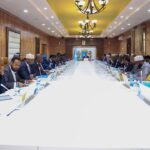MOGADISHU, Somalia — President Hassan Sheikh Mohamud of Somalia has declared his administration’s unwavering commitment to overhauling the nation’s electoral system, targeting universal suffrage by 2026.
The announcement was made during a ceremonial gathering in Mogadishu to celebrate the birthday of Britain’s King Charles III, highlighting the intertwining of international relations and domestic reform.
Addressing a diverse audience of diplomats, local dignitaries, and international observers, Mohamud emphasized the pivotal role of democratic elections in fortifying governance and propelling national development. “Elections are the bedrock of democracy, reflecting the genuine aspirations of the Somali populace,” he remarked, urging international partners to assist in Somalia’s quest for political maturity, security, and economic advancement.
The same day, in a move that underscores the government’s dedication to political transformation, Somalia’s Federal Parliament passed a historic bill with overwhelming support. This legislation, which saw 177 out of 178 parliamentarians in favor, is designed to regulate the formation and operation of political parties, laying the groundwork for a transition to a multi-party democracy.
The parliamentary session, held at Villa Hargeisa, was marked by a sense of unity among lawmakers, with only one abstention recorded, according to Speaker Sheikh Adan Mohamed Nur Madobe.
The law aims to normalize political activities, encouraging broader civic engagement and reducing the reliance on clan-based politics, which has long been a feature of Somali governance.
This legislative step is seen as a critical component in the broader strategy to ensure that future elections are inclusive, transparent, and reflective of the Somali people’s desire for change.
It comes at a time when Somalia is also grappling with ongoing security challenges, making the push toward democratic governance even more significant as a means to stabilize and unify the fractured nation.
The international community has reacted positively to these developments, with many seeing it as a step forward in Somalia’s long and arduous journey towards peace and democratic governance.
However, observers caution that the implementation of such reforms will require not just legislative action but also sustained efforts in security, voter education, and infrastructure development to ensure the elections are feasible and credible by 2026.






